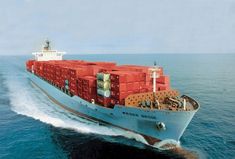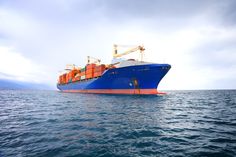Did you know that one of the most popular ways to export products is through sea freight? Did you also know that it's a highly effective way to transport a lot of cargo? In this article, we'll look at how the marine logistics service from China to the UK operates and why it's a popular choice for companies. In order for you to decide if this delivery method is the best choice for your company, we'll also highlight some of the advantages and disadvantages of employing it.
The Sea Logistics Service China to the UK
Since the beginning of time, the UK has prioritized commerce with China, and now, this connection is among the most significant in the entire globe. With a population of more than 1.3 billion, the surging Chinese economy makes it unsurprising that UK exports to China are also expanding quickly. Exports to China topped u00a327 billion in 2018, up from u00a324 billion in 2017. It is not unexpected that shipping is at the core of this thriving commercial relationship given the close economic linkages between the two nations.
The requirement for maritime transport services rises in tandem with the expansion of both economies. Container traffic between China and the UK surged by 17% between 2016 and 2017 alone as a result of this increased demand. The increase in container traffic has had a good effect on freight prices, which have decreased by about 10% between Asia and Europe over this time.
A network of marine logistics centers has been built between China and the UK in order to fulfill these expanding demands and guarantee that trustworthy maritime transport services are accessible for both Chinese and UK firms. Shanghai was the first such center to open, and then ones in Ningbo (2011), Qingdao (2012), Guangzhou (2014), Shenzhen (2015), and Beijing followed (2016). These facilities offer logistical support for both exports from China-bound ports and imports into China.

The China-UK Link Sea Logistics Service
China and the UK have a long-standing maritime connection. The Song Dynasty is the first time when trade between the two nations is mentioned, when a group of merchants crossed the Straits of Malacca to safe goods ship from China to Europe.
Regular British economic activity in China began in 1839 when the first British ship entered the estuary of the Canton River in China. A treaty granting reciprocal maritime rights over the Straits of Malacca and the Pearl River was signed in 1865 between Britain and China. This opened the door for greater trade with China, which over time developed into one of Britain's most important Asian dependencies.
An agreement between Britain and Japan in 1902 calling for reciprocal concessions in Shanghai and Tianjin served as a confirmation of this thriving commercial connection. More than 50,000 people were working for more than 1,000 British companies in China by 1914.
British commercial activity in China was put on hold when World War II broke out, but it quickly resumed once the Japanese surrendered. Due to Britain's status as one of the top industrial powers, trade between Britain and East Asia rapidly increased throughout the post-war era. With Japan's economic collapse in 1990 and subsequent exit from the World Trade Organization, this boom abruptly came to an end (WTO).

The China-UK Sea Logistics Service (CULS), the first of its type between the two nations, was introduced in 2010. By easing the flow of commodities between China and the UK, CULS seeks to enhance economic and business relations between the two nations.
More than 160,000 cargo & freight containers have been transported using CULS's service since its inception. Sino-British trade was US$126 billion in 2013, with a 36% year-over-year increase in Chinese exports to the UK. CULS has also aided in fostering collaboration in a number of areas, including investment, trade facilitation, and maritime security.
Theresa May traveled to Beijing in July 2016 and met with her Chinese colleague Li Keqiang, with whom she signed a memorandum of understanding discussing cooperation in industries like banking, investments, tourism, and industrial innovation. Following May's trip to Beijing in November 2015, when she revealed intentions for a u00a324 billion investment from China into Britain over the following five years, this deal was reached. Theresa May, the premier of the United Kingdom, and President Xi Jinping met in October 2017 to discuss how their countries may cooperate on international concerns including economic growth and climate change. Following investigations by The Guardian, which revealed that British intelligence agencies had been snooping on senior Chinese officials for years, this encounter signified an escalation in bilateral collaboration between London and Beijing.

For both nations, the naval cargo & logistics service between China and the UK has significant advantages. The UK must meet demand as the shipping industry in China expands quickly. By moving commodities through China, the service can assist the UK in lessening its reliance on foreign nations. The Chinese maritime sector is also regarded as one of the most trustworthy in the world. This translates to a higher likelihood for timely and flawless delivery of products submitted through the service. Last but not least, the Chinese shipping sector has a solid understanding of international maritime law, which makes it simpler for enterprises to adhere to rules in many nations.
Our primary business is air & sea shipping express, railway or truck delivery with DDP, DDU, FCL, or LCL terms. Matic Express was founded in 2007 and has its headquarters in Shenzhen, China. Changsha Chaintech Supply Chian Management Co, Ltd is a branch based in Changsha, China. We ship to Amazon warehouses as well as international warehouses.
Matic Express offers international freight delivery to the Amazon marketplace via truck shipment, express international rail shipping, and air shipping. The USA, Canada, France, Germany, Poland, Italy, Spain, Japan, New Zealand, and the UAE are among the nations we serve. In addition to picking up and delivering, we will also book, clear customs, and deliver locally at your house.
Matic Express provides door to door service shipping.
To store your goods, Matic Express has its own warehouses, which are spread out over Shenzhen, Yiwu, Ningbo, Shanghai, Guangzhou, Dalian, Chongqing, etc. All of it is collected at the warehouse. You can ship items to our warehouse on behalf of your suppliers. We provide delivery, stick-on labels with the weight and size, cargo inspections, and other services.
One of the most significant bilateral trade agreements in terms of value is the provision of sea freight services between China and the UK. In 2016, bilateral commerce was u00a328 billion, representing 10% of Chinese imports into the UK and 20% of all UK exports to China. Machinery, chemicals, medicines, food grains and other agricultural items, energy resources, ships and aviation parts are the principal goods exchanged between China and the UK through the marine logistics shipper.
The naval logistics service between China and the UK is currently confronting a lot of difficulties. The first issue is that neither country has the infrastructure nor ports to handle big volumes of commodities. Due to the shippers' need to pay for more time at port, this has caused congestion at the current ports and raised shipping rates. Both nations are constructing new ports that can handle heavier cargo loads in an effort to solve this issue.
The second issue is the wait time for customs clearance. It can take a while for products to pass through customs because there is no mutual understanding between the customs personnel from each nation. Due to Customs delays, cargo have been delivered late or not at all, resulting in severe losses for both parties. Both nations are working to enhance their neighborly cooperation mechanisms in order to solve this issue and speed up the customs clearance process for products.
Piracy is another problem that the China-UK sea logistics service must deal with. As it damages ships and interferes with regular operations, piracy has grown to be a significant barrier to maritime trade.